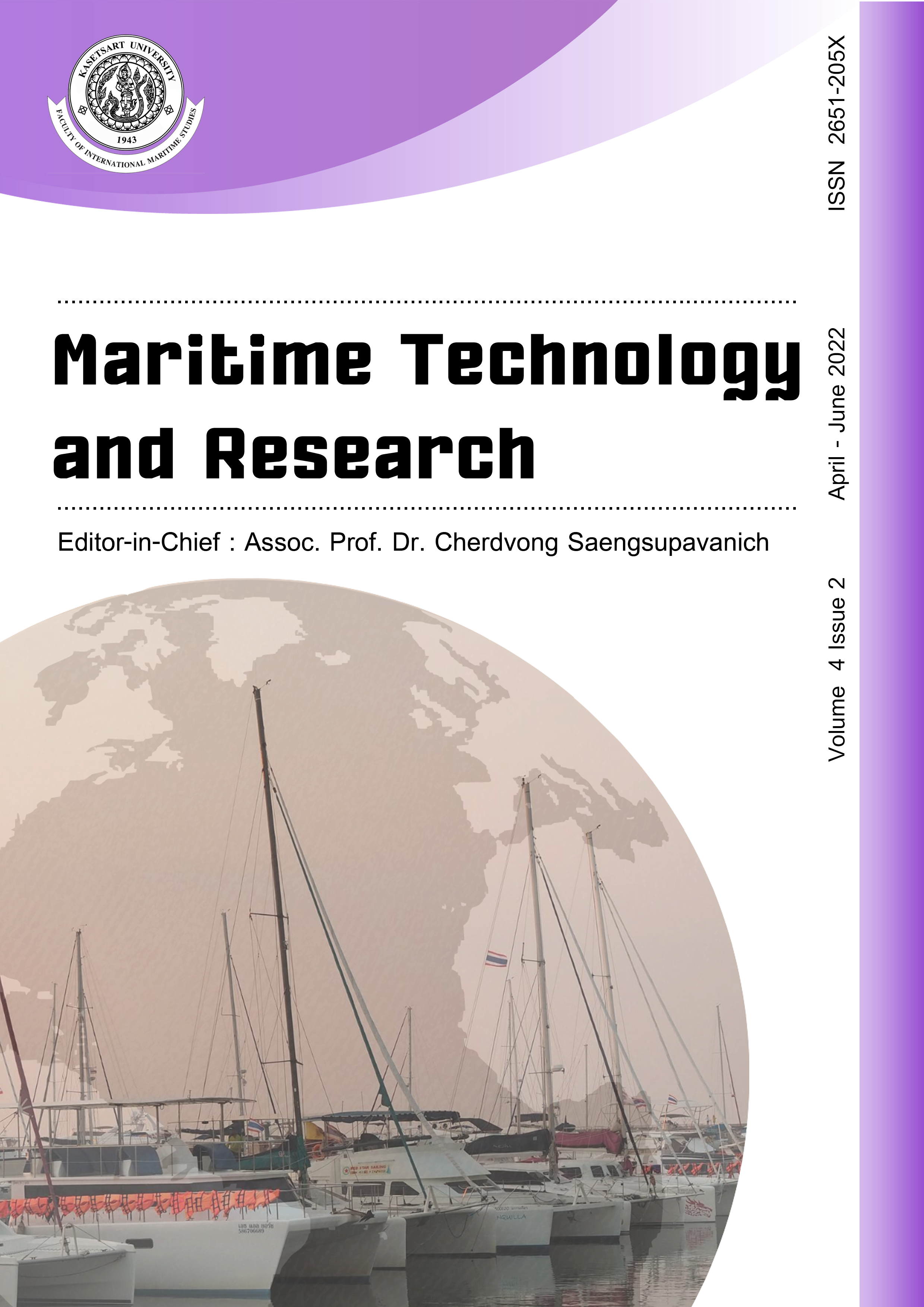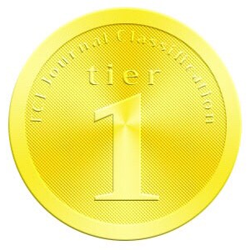Blue economy: The past and present from the world and future directions for Thailand
DOI:
https://doi.org/10.33175/mtr.2022.254043Keywords:
Blue economy, Coastal region, Overfishing, Sustainable growth, ThailandAbstract
This commentary article aims to summarize the past and present research of the blue economy from developing and developed nations and anticipates future research directions in the domain of blue economy policy research for Thailand. The importance of environmental protection, economic distribution, and social equality in the past were discussed and the present research shifted to addressing the complexity and defining the all-inclusive blue economy and all-inclusive participation, multiple stakeholder involvement and inter-regional cooperation, and global partnerships for knowledge and technology exchange. New blue economy sectors, such as ‘bioprospecting’, are also emerging in the present. However, the core concepts, such as defining ‘Blue Economy’, ‘Overfishing’, and ‘sustainable growth’, are still under debate. There is a perceptual disagreement among stakeholders in developing countries. Future directions in this research domain are also presented. This study concludes that future blue economy policies, plans, and implementation related research on blue economy must take account of environmental regulations and all-inclusive economic developmental plans that are measurable in terms of economic, environmental, and socio-cultural sustainability.
------------------------------------------------------------------------------
Cite this article: Koondee, P., Sharafuddin, M.A., Madhavan, M. (2022). Blue economy: The past and present from the world and future directions for Thailand. Maritime Technology and Research, 4(2), 254043. https://doi.org/10.33175/mtr.2022.254043
------------------------------------------------------------------------------
References
Andriamahefazafy, M., Bailey, M., Sinan, H., & Kull, C. A. (2020). The paradox of sustainable tuna fisheries in the Western Indian Ocean: Between visions of blue economy and realities of accumulation. Sustainability Science, 15(1), 75-89. https://doi.org/10.1007/s11625-019-00751-3
Attri, V. N. (2016). An emerging new development paradigm of the blue economy in IORA: A policy framework for the future (pp. 1-10). Chair Indian Ocean Studies, Indian Ocean Rim Association, University of Mauritius, Mauritius.
Bogadóttir, R. (2020). Blue Growth and its discontents in the Faroe Islands: An island perspective on Blue (De)Growth, sustainability, and environmental justice. Sustainability Science, 15(1), 103-115. https://doi.org/10.1007/s11625-019-00763-z
Castillo, C. C., Bellina, B., & Fuller, D. Q. (2016). Rice, beans and trade crops on the early maritime silk route in Southeast Asia. Antiquity, 90(353), 1255-1269. https://doi.org/10.15184/aqy.2016.175
Cohen, P. J., Allison, E. H., Andrew, N. L., Cinner, J., Evans, L. S., Fabinyi, M., Garces, L. R., Hall, S. J., Hicks, C. C., Hughes, T. P., Jentoft, S., Mills, D. J., Masu, R., Mbaru, E. K., & Ratner, B. D. (2019). Securing a just space for small-scale fisheries in the blue economy. Frontiers in Marine Science, 6(3), 171. https://doi.org/10.3389/fmars.2019.00171
Ebarvia, M. C. M. (2016). Economic assessment of oceans for sustainable blue economy development. Journal of Ocean and Coastal Economics, 2(2), 7. https://doi.org/10.15351/2373-8456.1051
Ertör, I., & Hadjimichael, M. (2020). Editorial: Blue de-growth and the politics of the sea: Rethinking the blue economy. Sustainability Science, 15(1), 1-10. https://doi.org/10.1007/s11625-019-00772-y
Farmery, A. K., Allison, E. H., Andrew, N. L., Troell, M., Voyer, M., Campbell, B., Eriksson, H., Fabinyi, M., Song, A. M., & Steenbergen, D. (2021). Blind spots in visions of a “blue economy” could undermine the ocean’s contribution to eliminating hunger and malnutrition. One Earth, 4(1), 28-38. https://doi.org/10.1016/j.oneear.2020.12.002
Gonzales, A. T., Kelley, E., & Bernad, S. R. Q. (2019). A review of intergovernmental collaboration in ecosystem-based governance of the large marine ecosystems of East Asia. Deep-Sea Research Part II: Topical Studies in Oceanography, 163, 108-119. https://doi.org/10.1016/j.dsr2.2019.05.014
Hadjimichael, M. (2018). A call for a blue de-growth: Unravelling the European Union’s fisheries and maritime policies. Marine Policy, 94, 158-164. https://doi.org/10.1016/j.marpol.2018.05.007
Harakunarak, A. (2016). Blue economy: How would mangroves in Thailand further advance and sustain connectivity in the Bay of Bengal Region (p. 119). In Proceedings of the Cooperative Partnership and Sustainable Development, Dhaka, Bangladesh.
Hultzsch, E. (1913). XII. Note on a tamil inscription in siam. Journal of the Royal Asiatic Society of Great Britain & Ireland, 45(2), 337-339. https://doi.org/10.1017/S0035869X00044609
Hussain, M. G., Failler, P., Karim, A. Al, & Alam, M. K. (2018). Major opportunities of blue economy development in Bangladesh. Journal of the Indian Ocean Region, 14(1), 88-89. https://doi.org/10.1080/19480881.2017.1368250
Jacq-Hergoualc’h, M., Supajanya, T., & Krisanapol, W. (1998). A stopping point along the maritime Silk Road. The southern part of the Kra Isthmus during the 9th century. Journal Asiatique, 286(1), 235-320. https://doi.org/10.2143/ja.286.1.556508
Kathijotes, N. (2013). Keynote: Blue economy: Environmental and behavioural aspects towards Sustainable coastal development. Procedia - Social and Behavioral Sciences, 101, 7-13. https://doi.org/10.1016/j.sbspro.2013.07.173
Keen, M. R., Schwarz, A. M., & Wini-Simeon, L. (2018). Towards defining the Blue economy: Practical lessons from pacific ocean governance. Marine Policy, 88, 333-341. https://doi.org/10.1016/j.marpol.2017.03.002
Krailassuwan, S. (2019). History of Thai maritime trade. Maritime Technology and Research, 1(1), 9-14. https://doi.org/10.33175/mtr.2019.147777
Lee, K. H., Noh, J., & Khim, J. S. (2020). The Blue Economy and the United Nations’ sustainable development goals: Challenges and opportunities. Environment International, 137, 105528. https://doi.org/10.1016/j.envint.2020.105528
Loonela, V., & Soumillion, S. (2020). 2020 Blue economy report: Blue sectors contribute to the recovery and pave way for EU Green Deal. Press Release, European Commission.
Novaglio, C., Bax, N., Boschetti, F., Emad, G. R., Frusher, S., Fullbrook, L., Hemer, M., Jennings, S., van Putten, I., Robinson, L. M., Spain, E., Vince, J., Voyer, M., Wood, G., & Fulton, E. A. (2021). Deep aspirations: Towards a sustainable offshore Blue economy. Reviews in Fish Biology and Fisheries. https://doi.org/10.1007/s11160-020-09628-6
Okafor-Yarwood, I., Kadagi, N. I., Miranda, N. A. F., Uku, J., Elegbede, I. O., & Adewumi, I. J. (2020). The blue economy-cultural livelihood-ecosystem conservation triangle: The African experience. Frontiers in Marine Science, 7, 586. https://doi.org/10.3389/fmars.2020.00586
Pauly, D. (2018). A vision for marine fisheries in a global blue economy. Marine Policy, 87, 371-374. https://doi.org/10.1016/j.marpol.2017.11.010
Phelan, A., Ruhanen, L., & Mair, J. (2020). Ecosystem services approach for community-based ecotourism: towards an equitable and sustainable blue economy. Journal of Sustainable Tourism, 28(10), 1665-1685. https://doi.org/10.1080/09669582.2020.1747475
Pinto, H., Cruz, A. R., & Combe, C. (2015). Cooperation and the emergence of maritime clusters in the Atlantic: Analysis and implications of innovation and human capital for blue growth. Marine Policy, 57, 167-177. https://doi.org/10.1016/j.marpol.2015.03.029
Ragin, C. C. (2018). What is Qualitative Comparative Analysis (QCA)? Economic and Social Research Council’s Research Methods Festival.
Sampaolo, G., Lepore, D., & Spigarelli, F. (2021). Blue economy and the quadruple helix model: The case of Qingdao. Environment, Development and Sustainability, 23, 16803-16818. https://doi.org/10.1007/s10668-021-01378-0
Sarker, S., Bhuyan, M. A. H., Rahman, M. M., Islam, M. A., Hossain, M. S., Basak, S. C., & Islam, M. M. (2018). From science to action: Exploring the potentials of Blue economy for enhancing economic sustainability in Bangladesh. Ocean and Coastal Management, 157, 180-192. https://doi.org/10.1016/j.ocecoaman.2018.03.001
Satizábal, P., Dressler, W. H., Fabinyi, M., & Pido, M. D. (2020). Blue economy discourses and practices: Reconfiguring ocean spaces in the Philippines. Maritime Studies, 19(2), 207-221. https://doi.org/10.1007/s40152-020-00168-0
Sharafuddin, M. A., & Madhavan, M. (2020a). Measurement model for assessing community based wellness tourism needs. E-Review of Tourism Research, 18(2), 311-336.
Sharafuddin, M. A., & Madhavan, M. (2020b). Thematic evolution of blue tourism: A scientometric analysis and systematic review. Global Business Review. https://doi.org/10.1177/0972150920966885
Silver, J. J., Gray, N. J., Campbell, L. M., Fairbanks, L. W., & Gruby, R. L. (2015a). Blue economy and competing discourses in international oceans governance. Journal of Environment and Development, 24(2), 135-160. https://doi.org/10.1177/1070496515580797
Smith-Godfrey, S. (2016). Defining the blue economy. Maritime Affairs, 12(1), 58-64. https://doi.org/10.1080/09733159.2016.1175131
Taylor, J. E. (2013). Knowing the black box: Methodological challenges in marine environmental history. Environmental History, 18(1), 60-75. https://doi.org/10.1093/envhis/ems108
van Wyk, J. A. (2015). Defining the blue economy as a South African strategic priority: Toward a sustainable 10th province? Journal of the Indian Ocean Region, 11(2), 153-169. https://doi.org/10.1080/19480881.2015.1066555
Wenhai, L., Cusack, C., Baker, M., Tao, W., Mingbao, C., Paige, K., Xiaofan, Z., Levin, L., Escobar, E., Amon, D., Yue, Y., Reitz, A., Neves, A. A. S., O’Rourke, E., Mannarini, G., Pearlman, J., Tinker, J., Horsburgh, K. J., Lehodey, P., Pouliquen, S., Dale, T., Peng, Z., & Yufeng, Y. (2019). Successful blue economy examples with an emphasis on international perspectives. Frontiers in Marine Science, 6, 261. https://doi.org/10.3389/fmars.2019.00261
World Bank. (2017). The potential of the blue economy: Increasing long-term benefits of the sustainable use of marine resources for small island developing states and coastal least developed countries. World Bank, Washington DC.
Downloads
Published
Issue
Section
License
Copyright (c) 2021 Maritime Technology and Research

This work is licensed under a Creative Commons Attribution-NonCommercial-NoDerivatives 4.0 International License.
Copyright: CC BY-NC-ND 4.0








